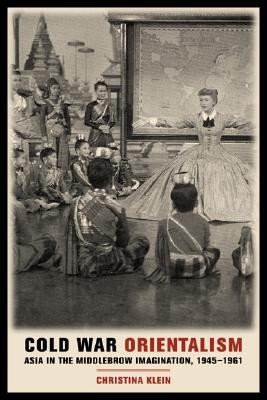| Cold War Orientalism: Asia in the Middlebrow Imagination, 1945-1961 Contributor(s): Klein, Christina (Author) |
|
 |
ISBN: 0520232305 ISBN-13: 9780520232303 Publisher: University of California Press OUR PRICE: $34.60 Product Type: Paperback - Other Formats Published: March 2003 Annotation: "Christina Klein takes a fresh, stimulating, and enlightening look at the complex visions of Asia dreamed over the decades by American popular culture. She argues her provocative viewpoints with the verve and flair of a showman, in a book which helps us to see the whole world through new eyes."--David Henry Hwang, author of "M. Butterfly and "Flower Drum Song (2002) "An extraordinarily interesting study of 'Cold War internationalism.' Klein's brilliant and imaginative reading of such musicals as "South Pacific and "The King and I enables us to see how culture and geopolitics were woven together to transform the Cold War order into today's ethnically diverse and economically interdependent world--within the framework of 'U.S. global expansion.'"--Akira Iriye, Professor of History, Harvard University, and author, "Global Community
|
| Additional Information |
| BISAC Categories: - History | Americas (north Central South West Indies) - Literary Criticism | American - General - Social Science |
| Dewey: 950.424 |
| LCCN: 2002013310 |
| Lexile Measure: 1480 |
| Physical Information: 0.85" H x 6" W x 9.18" (1.19 lbs) 336 pages |
| Themes: - Cultural Region - Asian |
| Descriptions, Reviews, Etc. |
| Publisher Description: In the years following World War II, American writers and artists produced a steady stream of popular stories about Americans living, working, and traveling in Asia and the Pacific. Meanwhile the U.S., competing with the Soviet Union for global power, extended its reach into Asia to an unprecedented degree. This book reveals that these trends-the proliferation of Orientalist culture and the expansion of U.S. power-were linked in complex and surprising ways. While most cultural historians of the Cold War have focused on the culture of containment, Christina Klein reads the postwar period as one of international economic and political integration-a distinct chapter in the process of U.S.-led globalization. Through her analysis of a wide range of texts and cultural phenomena-including Rodgers and Hammerstein's South Pacific and The King and I, James Michener's travel essays and novel Hawaii, and Eisenhower's People-to-People Program-Klein shows how U.S. policy makers, together with middlebrow artists, writers, and intellectuals, created a culture of global integration that represented the growth of U.S. power in Asia as the forging of emotionally satisfying bonds between Americans and Asians. Her book enlarges Edward Said's notion of Orientalism in order to bring to light a cultural narrative about both domestic and international integration that still resonates today. |